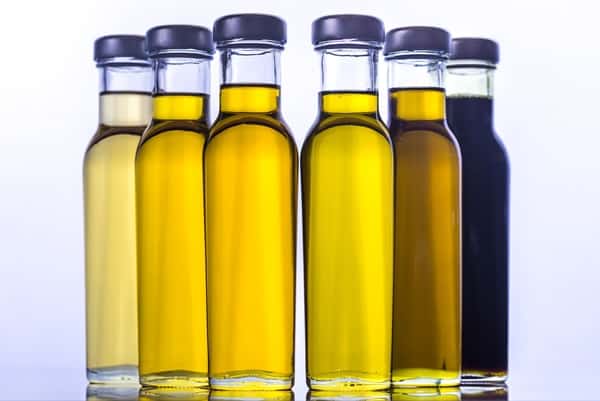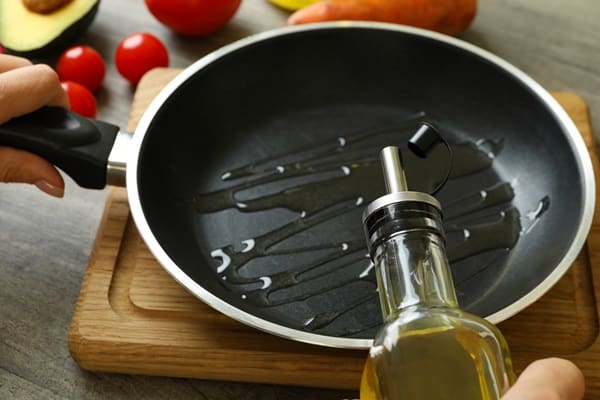Cooking oils are a staple in kitchens worldwide, playing a crucial role in both the flavor and nutritional content of your meals. However, not all oils are created equal, and some may even pose significant health risks or environmental concerns. This post delves into the less-discussed side of cooking oils, highlighting those you might want to avoid for the sake of your health and the planet. By understanding the negative aspects of certain oils, you can make more informed choices that align with your culinary needs and health goals.
Contents
- 1 Highly Processed Vegetable Oils: A Health Hazard
- 2 Palm Oil: Environmental and Health Concerns
- 3 Cottonseed Oil: The Allergen and Toxin Carrier
- 4 Partially Hydrogenated Oils: Trans Fats Galore
- 5 Margarine: The Butter Substitute Debate
- 6 Unrefined Oils at High Heat: A Recipe for Oxidation
- 7 Grapeseed Oil: The Omega Imbalance
- 8 Flavored and Infused Oils: Hidden Risks
- 9 Make Healthier Choices in Your Kitchen
Highly Processed Vegetable Oils: A Health Hazard

Highly processed vegetable oils, such as some varieties of canola, corn, and soybean oil, are ubiquitous in the modern diet, often lauded for their versatility and neutral flavor. Yet, the extensive processing these oils undergo can strip them of nutrients and introduce harmful compounds. These oils are typically high in omega-6 fatty acids, which, when consumed in excess, can lead to an imbalance in the body’s omega-6 to omega-3 ratio, fostering inflammation and contributing to chronic diseases. The refining process also sometimes leads to the formation of trans fats, known for their detrimental effects on heart health.
Moreover, the health implications of consuming these oils extend beyond the individual to societal health issues. Regular consumption of highly processed oils is linked to increased risks of heart disease, obesity, and diabetes. The hidden costs of these oils are not immediately apparent, as they often sneak into foods under the guise of being “heart-healthy.” It’s crucial to read labels and understand the sources of fats in your diet to minimize the intake of these processed oils. Replacing them with less processed alternatives can have a substantial positive impact on your health.
Palm Oil: Environmental and Health Concerns

Palm oil is found in an array of products, from food to cosmetics, prized for its semi-solid consistency at room temperature and longer shelf life. However, the environmental cost of palm oil production is steep, with large tracts of tropical forests cleared and burned to make way for palm plantations, contributing to biodiversity loss and increased greenhouse gas emissions. This habitat destruction threatens endangered species and disrupts local communities, making the environmental impact of palm oil a pressing global concern.
From a health perspective, palm oil is high in saturated fats, which can raise cholesterol levels and increase the risk of heart disease when consumed in large amounts. While it’s more stable for cooking compared to some unsaturated fats, the health and environmental costs often outweigh the benefits. Consumers looking to make more sustainable and health-conscious choices might consider reducing their palm oil intake and opting for oils with a better balance of fats, such as olive oil or alternatives sourced from sustainable, certified producers that minimize environmental impact.
Cottonseed Oil: The Allergen and Toxin Carrier

Cottonseed oil is a byproduct of the cotton industry, and its use in foods is widespread due to its low cost and high smoke point. However, it’s one of the less discussed oils when it comes to health implications. Cotton plants are heavily treated with pesticides, and residues can end up in the oil, posing potential health risks. Furthermore, cottonseed oil contains natural toxins and allergens that can be problematic for some individuals, especially those with specific sensitivities or allergies.
In addition to allergenic concerns, the safety of cottonseed oil is sometimes questioned due to the limited regulation and oversight in its production. Unlike oils specifically grown for consumption, cotton is primarily an industrial crop, and the oil’s safety standards might not be as stringent. Consumers should be wary of the potential impurities and consider the environmental and health implications of the pesticides used in cotton cultivation. As with other oils, looking for organic or minimally processed options can reduce some of these risks.
Partially Hydrogenated Oils: Trans Fats Galore

Partially hydrogenated oils were once a mainstay in the food industry, valued for their extended shelf life and stability. These oils are created by adding hydrogen to liquid vegetable oils, making them more solid at room temperature. However, this process also produces trans fats, which have been unequivocally linked to an increased risk of heart disease, stroke, and other chronic conditions. Trans fats raise bad cholesterol (LDL) levels while lowering good cholesterol (HDL), fostering a perfect storm for cardiovascular issues.
Acknowledging the severe health risks, many countries have taken steps to reduce or eliminate trans fats from food supplies. Consumers are becoming more aware of the dangers, leading to a decrease in demand for products containing partially hydrogenated oils. However, vigilance is still needed as trans fats can lurk in various processed foods. Reading labels and understanding ingredient lists is crucial for avoiding these harmful fats, and seeking out whole, unprocessed foods is often the safest bet for maintaining a healthy diet.
Margarine: The Butter Substitute Debate

Margarine emerged as a popular alternative to butter, lauded for its lower saturated fat content and versatility in cooking and baking. Initially, margarine manufacturers used partially hydrogenated oils to achieve the desired consistency and shelf life, leading to high trans fat content. However, with increasing awareness of trans fats’ health risks, many brands have reformulated their products to be trans-fat-free, using a blend of non-hydrogenated oils and emulsifiers instead. Despite these changes, the debate continues regarding margarine’s healthfulness, especially in comparison to butter and other natural spreads.
While modern margarine may be free of trans fats, it’s still a highly processed food containing various additives and artificial ingredients. Consumers are often faced with a complex choice: opting for margarine as a supposedly healthier alternative to butter or choosing natural fats that, while potentially higher in saturated fat, lack the artificial components and processing of margarine. To make an informed decision, it’s important to read labels carefully, considering the type of oils used, the presence of additives, and the overall fat composition of the margarine in question.
Unrefined Oils at High Heat: A Recipe for Oxidation

Unrefined oils, like extra virgin olive oil, cold-pressed coconut oil, and artisanal nut oils, are celebrated for their robust flavors and nutritional profiles, preserving the natural antioxidants and vitamins found in the source seeds, nuts, or fruits. These oils are best used at low temperatures or added after cooking to maintain their health benefits and delicate flavors. However, when subjected to high heat, unrefined oils can quickly become a health hazard, breaking down and oxidizing, which not only degrades their nutritional quality but also creates harmful compounds.
The key issue with using unrefined oils at high temperatures is their low smoke point, the temperature at which the oil begins to smoke, indicating decomposition. When an oil reaches its smoke point, it not only loses its beneficial properties but also starts forming free radicals and other harmful substances. To avoid these negative effects, it’s crucial to choose the right oil for the right cooking method, reserving unrefined oils for cold dishes, dressings, or gentle sautéing, and opting for oils with higher smoke points for frying or roasting.
Grapeseed Oil: The Omega Imbalance

Grapeseed oil is often marketed as a healthy cooking oil due to its light flavor and high smoke point, making it versatile for various cooking methods. However, its health profile is controversial due to its high omega-6 fatty acid content. While omega-6s are essential fats, necessary for proper body function, an imbalance in the ratio of omega-6 to omega-3 fatty acids in the diet is linked to inflammation, heart disease, and other chronic health issues. Grapeseed oil’s omega-6 content significantly outweighs its omega-3 content, potentially contributing to this imbalance when used excessively.
In addition to the omega imbalance, the extraction process of grapeseed oil often involves chemical solvents, raising concerns about trace chemicals remaining in the oil. For those seeking to maintain a healthy balance of fatty acids in their diet, it’s essential to consider not just the type of oil, but also the broader context of their overall fat intake. Incorporating oils rich in omega-3s, like flaxseed or walnut oil, and reducing consumption of high omega-6 oils, can help correct this imbalance and support overall health.
Flavored and Infused Oils: Hidden Risks

Flavored and infused oils, with their enticing aromas and tastes, are a delightful addition to any culinary repertoire, elevating dishes with a burst of gourmet flavor. These oils are typically made by steeping herbs, spices, fruits, or chili in oil, absorbing their essences. While they can add a unique twist to meals, homemade infused oils especially pose significant food safety risks. If not prepared or stored properly, they can become a breeding ground for bacteria, including Clostridium botulinum, which causes botulism, a rare but potentially fatal illness.
To safely enjoy flavored and infused oils, it’s crucial to understand and follow proper preparation and storage techniques. For instance, infused oils should be used quickly or stored in the refrigerator to inhibit bacterial growth. Commercially prepared flavored oils usually undergo strict safety protocols, making them a safer bet than homemade versions. Still, consumers should always check expiration dates and storage instructions to ensure safety. As delightful as these oils can be, understanding their risks and how to mitigate them is key to enjoying their flavors without compromising health.
Make Healthier Choices in Your Kitchen
In navigating the complex world of cooking oils, it’s essential to prioritize your health and the environment. By understanding the risks associated with certain oils and opting for healthier, more sustainable alternatives, you can significantly improve your dietary habits. Embrace oils that align with your nutritional needs and environmental values, and always be vigilant about reading labels and staying informed. Let’s commit to making healthier, more conscious choices in the kitchen starting today.


